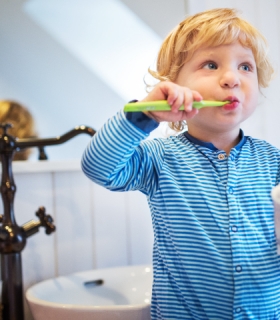Article at a Glance
Keeping those pearly whites clean is more important than most people realize. Did you know that problems in your mouth can affect your overall health? For example studies have found correlations between oral health and diseases like heart disease and diabetes.
Many people don’t know it, but proper dental care should begin before the first tooth even shows up.
Your baby’s teeth will start to form between the third and sixth months of your pregnancy. Eating a healthy diet with lots of calcium, protein, phosphorous, and vitamin A, C, and D, will help your baby get the nutrients needed to develop healthy and strong teeth.
Pregnant mothers also need to take good care of their own teeth. Having a gum infection while pregnant can increase your baby’s risk of premature birth or low birth weight.
Clean your baby’s gums daily by rubbing them with a damp washcloth. This will help clean out any harmful bacteria.
Don’t leave a bottle of formula, milk, or juice in the crib when you put your baby to sleep. This can cause tooth decay, even if your baby doesn’t have teeth yet.
Did you also know that you can spread decay from your own mouth when you share utensils or “clean” off your baby’s pacifier in your mouth?
Once teeth start poking out, use a baby toothbrush with water and a tiny bit of baby toothpaste. You will want to start flossing once your child has two teeth that touch.
Look into booking your child’s first dental visit. The American Dental Association says that children should be seen by a dentist by their first birthday. Consider using a pediatric dentist. They specialize in dental issues that are associated with children and are well equipped to handle nervous or energetic children.
After your first visit, check ups should be every 3 to 12 months depending on what your dentist recommends.
Once your child can spit, you can start to use a pea-sized amount of fluoride toothpaste. Be sure your child does not swallow it.
Continue to supervise and help your children floss and brush until you are sure they can do it properly on their own.
Brushing
We should brush our teeth twice a day for two minutes at a time. Using a timer or an hourglass is a good way to help children know how long to brush for. Some electric toothbrushes even have a timer built in. Tips on brushing your teeth >
If your child takes medication before going to bed, remember to wait and do the brushing afterwards. Many children’s medications contain sugar.
Flossing
We should also floss twice a day. Flossing takes more coordination; so most children can’t floss by themselves until they are about 10 years old. Tips on how to floss >
Fluoride
Using fluoride can help prevent cavities. Many cities in the United States already add fluoride to the water supply, but most of the cities in Utah County do not (check your city).
You can use toothpaste with fluoride in it, but it is not enough fluoride to properly protect against cavities. If your city does not put fluoride in its water supply, you may want to ask your dentist about fluoride supplements.
If your child is prone to cavities, you can also ask about sealants. Sealants prevent decay by adding a protective coating around the tooth’s enamel.
Children start to lose their baby teeth around age 5 or 6 years old, and the last teeth come out around 12 to 13 years old.
Even though baby teeth are temporary, they are important. Baby teeth serve as a space holder for the adult teeth coming in. If a baby tooth comes out too early, neighboring teeth can drift into its spot. This makes it hard for the adult tooth to emerge when it is ready.
Decay in the mouth is also unhealthy, even if the tooth is only temporary. It can lead to other health problems, spread to the adult teeth below, or cause tooth pain.
Need help getting your kids to brush? www.mouthhealthykids.org has some wonderful resources for kids including videos, games, and activity sheets.
More Information
Keeping Your Child’s Teeth Healthy (kidshealth.org)
Babies and Kids (mouthhealthy.org)
